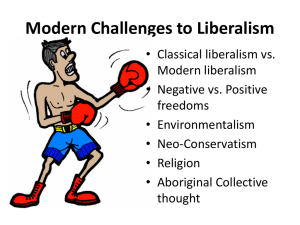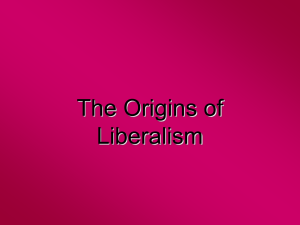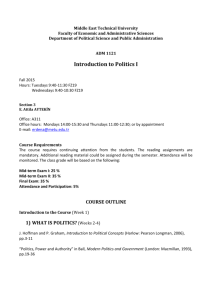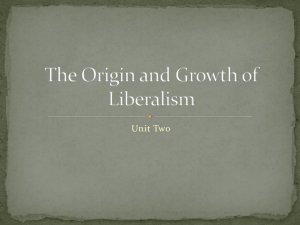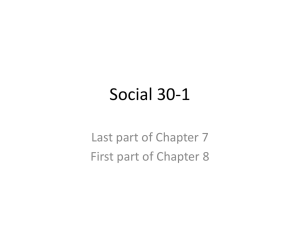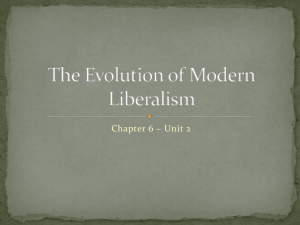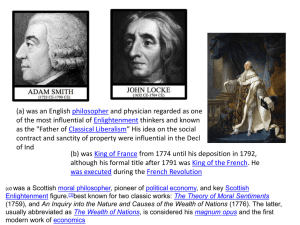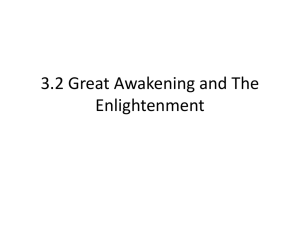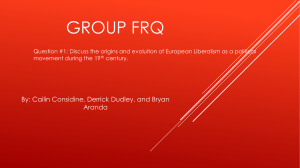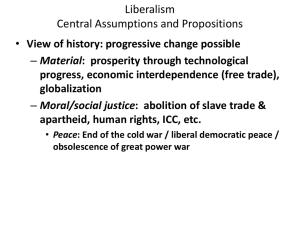Issue #2: To what extent is resistance to liberalism justified?
advertisement
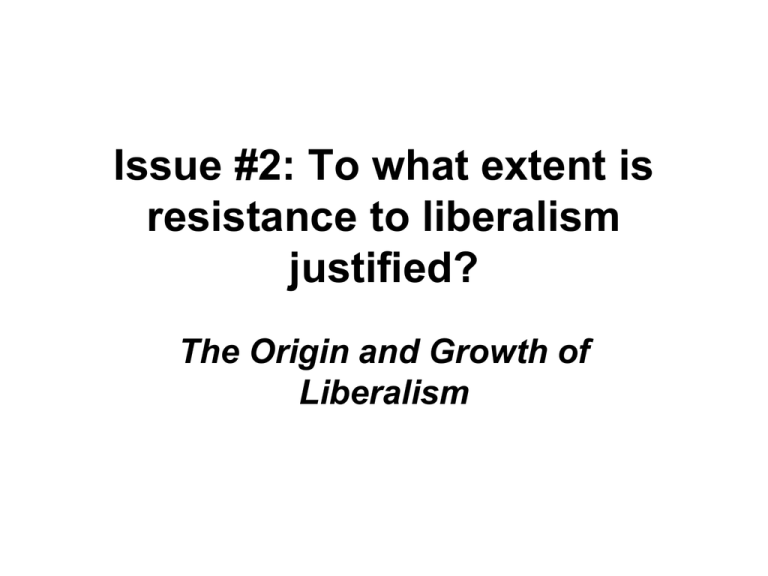
Issue #2: To what extent is resistance to liberalism justified? The Origin and Growth of Liberalism The word liberal comes from the Latin liber, meaning ‘free’. It was first used as a political term in Spain during the Napoleonic Wars. The ideas of liberalism are older than the name and they emerged in the 1700’s during the Enlightenment. Individuals such as Locke, Smith, Jefferson, Montesquieu wrote about personal freedom, limited government (economically and socially) consent of the governed, yet these writers never called themselves liberals. Their beliefs laid the foundation for what is now called classical liberalism. Modern liberalism includes the political beliefs and social rights of classical liberalism, yet it rejects some of the economic beliefs of classical liberalism. Remember: principles of individualism • • • • • • The rule of law Individual rights and freedoms Private property Economic freedom Self-interest competition Where did classical liberalism come from? Medieval Period: agrarian; feudalism Renaissance: (14th – 18th centuries) The term Renaissance, literally means "rebirth" and is the period in European civilization immediately following the Middle Ages, conventionally held to have been characterized by a surge of interest in classical learning and values. • revival of Greek and Roman thinking • use of logical argument and reason Centers of the Enlightenment The Philosophers of Enlightenment • A group of social critics in France • Opposed to the divine right and absolute monarchies • Objected to the privileges of the nobility and clergy • Believed people were capable of governing themselves • Turned away from traditional religious values; most were atheists or deists (believed in God, not the Church) Where did classical liberalism come from? Reformation: (16th – 17th century) The Reformation began on October 31, 1517, when German monk Saint Martin Luther nailed his 95 Theses to the Castle Church door in Wittenberg, Germany. • questioned the power of the Catholic Church • faith in the rationality of the individual • Contact with the indigenous people of North America • Europe in turmoil • Growth of cities • Wealthy middle class Where did classical liberalism come from? Enlightenment (Age of Reason) • Late 17th and 18th century • The rise of Classical Liberalism focused on allowing citizens the right to freedom in their economic, political, and social lives. Principles of Liberalism • Individual rights and freedoms exercised in the individual’s self-interest • Humans are reasonable and can make rational decisions that will benefit both themselves and society as whole • Economic freedom (private property and markets without government intervention) • Protection of civil liberties • Constitutional limitations on the government (rule of law) Key Thinkers Thomas Hobbes: humans are selfish, need to hand over power to one ruler to protect individual rights. John Locke: people use reason and logic to make decisions, social contract between the people and government. Montesquieu: worth of the individual, equality, accountability of governments, and separation of powers. Key Thinkers John Stuart Mill: protection of individual freedom, protection of individual decision making (as long as others are not harmed) Adam Smith: people work for their own selfinterests everyone would be better off, laissez-faire capitalism. John Locke (1632-1704) • Letter on Toleration, 1689 • Two Treatises of Government, 1690 • Some Thoughts Concerning Education, 1693 • The Reasonableness of Christianity, 1695 John Locke’s Philosophy (I) • The individual must become a “rational creature.” • Virtue can be learned and practiced. • Human beings possess free will. – they should be prepared for freedom. – obedience should be out of conviction, not out of fear. • Legislators owe their power to a contract with the people. • Neither kings nor wealth are divinely ordained. John Locke’s Philosophy (II) • There are certain natural rights that are endowed by God to all human beings. – life, liberty, property! • The doctrine of the Divine Right of Kings was nonsense. • He favored a republic as the best form of government. The Baron de Montesquieu (1689-1755) • Persian Letters, 1721 • On the Spirit of Laws, 1758 Montesquieu’s Philosophy • Three types of government: – Monarchy. – Republic. – Despotism. • A separation of political powers ensured freedom and liberty. Montesquieu’s Philosophy Believed in the separation of powers in government Executive Legislative Judicial Enforce laws, make laws, interpret the law Believed that liberty of the people must be guarded from corrupt leaders Adam Smith Laissez-Faire Economics • Scotsman who was influenced by economic doctrine of the physiocrats* – published Inquiry into the Nature and Causes of the Wealth of Nations (revolutionized economic systems in the western world) *physiocrat, any of a school of economists founded in 18thcentury France and characterized chiefly by a belief that government policy should not interfere with the operation of natural economic laws and that land is the source of all wealth. It is generally regarded as the first scientific school of economics. Adam Smith (II) • Argued labor of any kind produced wealth but business must be free from government interference in order to achieve increased production and contribute to the wealth of the nation as a whole • Laissez-faire incorporated a sense of individual freedom – operating out of self interest an individual would contribute to increasing the wealth of the entire community Adam Smith (III) • Supply and demand → market would be ruled by the consumer • The absence of government regulation enhanced by competition and self interest would establish a system that operated in the best interests of both producer and consumer • The “invisible hand” would guide the community to greater wealth • Role of the government – to provide for the defense of the nation, the protection of citizens and their property and to provide essential public services (education) The French Revolution • Was an attempt to transform society using liberal principles. • The Declaration of the Rights of Man and of the Citizen • Complete concept review page 118. Liberalism in Action • The Industrial Revolution: – Government should allow capitalism and its free market economy so people can pursue their own interests and individual happiness. – Support industrialism and technological change. – All lead to liberty and freedom. Industrial Revolution • Begins in Britain • Cottage industries were moving to factories • Happens due to changed thinking – Belief in human potential – Gov’t was friendly to business – Lots of investment capital and cheap labour • Laissez-Faire Economics Causes of the Industrial Revolution: • The end of feudalism changes economic relationships. • Higher population because of less disease and lower infant mortality allowed for a larger industrial workforce. • The agricultural revolution frees people from the soil, allowing – or driving – them into cities and manufacturing. • Proportionally large amounts of spare capital for investment. • Inventions and the scientific revolution allowing for new technology. • Colonial trade networks. • The presence of all the required resources close together. • Culture of hard work, taking risks and developing ideas.

